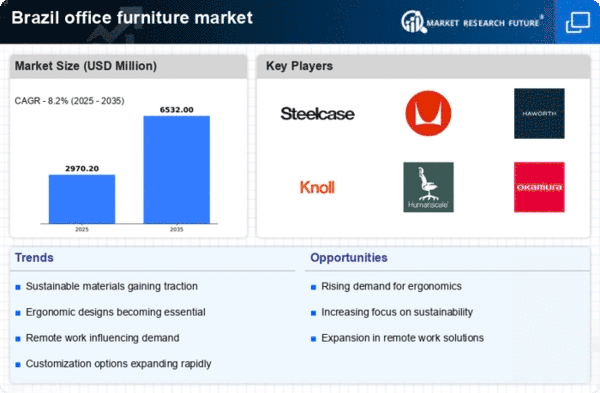Growth of Remote Work Culture
The rise of remote work has significantly influenced the office furniture market in Brazil. As more companies adopt flexible work arrangements, there is a growing need for home office solutions that cater to remote employees. This shift has led to an increase in demand for compact and multifunctional furniture that can fit into smaller living spaces. In 2025, it is estimated that the market for home office furniture will account for around 30% of total sales in the office furniture market. This trend indicates a transformation in consumer preferences, as individuals seek furniture that not only serves a practical purpose but also enhances their home office aesthetics. Consequently, manufacturers are adapting their offerings to meet these evolving needs.
Urbanization and Space Constraints
Urbanization in Brazil is driving changes in the office furniture market, as more businesses establish themselves in densely populated areas. The increasing cost of real estate has led to smaller office spaces, necessitating the need for space-efficient furniture solutions. In 2025, it is anticipated that the demand for modular and adaptable office furniture will rise by approximately 25%, as companies seek to maximize their limited space. This trend indicates a shift towards furniture that can be easily reconfigured to accommodate various work styles and team sizes. As urban centers continue to grow, the office furniture market must adapt to these spatial challenges, offering innovative solutions that cater to the needs of modern businesses.
Increased Focus on Employee Well-being
The emphasis on employee well-being is a pivotal driver in the office furniture market. Companies in Brazil are increasingly recognizing the importance of creating workspaces that promote mental and physical health. This has led to a surge in demand for furniture that supports wellness initiatives, such as standing desks and collaborative seating arrangements. In 2025, it is projected that wellness-oriented office furniture will represent approximately 20% of the overall market. This shift reflects a broader understanding that a healthy work environment can lead to higher productivity and lower absenteeism. As organizations invest in employee well-being, the office furniture market is likely to evolve to include more products designed with health benefits in mind.
Sustainability and Eco-friendly Materials
Sustainability is becoming a crucial consideration in the office furniture market, particularly in Brazil. As environmental awareness increases, consumers are seeking furniture made from eco-friendly materials and sustainable production processes. This trend is reflected in the growing market for recycled and responsibly sourced materials, which is expected to account for around 15% of total sales in the office furniture market by 2025. Companies are responding to this demand by incorporating sustainable practices into their manufacturing processes, which not only appeals to environmentally conscious consumers but also enhances brand reputation. As sustainability becomes a key driver, the office furniture market is likely to see a rise in innovative designs that prioritize both functionality and environmental responsibility.
Technological Advancements in Office Furniture
Integrating technology into the office furniture market is reshaping the landscape in Brazil. Smart desks and chairs equipped with sensors that monitor posture and productivity are gaining traction. This trend is driven by the increasing demand for ergonomic solutions that enhance employee well-being. In 2025, the market for technologically advanced office furniture is projected to grow by approximately 15%, reflecting a shift towards more interactive and health-conscious work environments. Companies are investing in these innovations to improve employee satisfaction and productivity, which are critical factors in the competitive business landscape. As a result, the office furniture market is likely to see a surge in products that combine functionality with cutting-edge technology.





















Leave a Comment